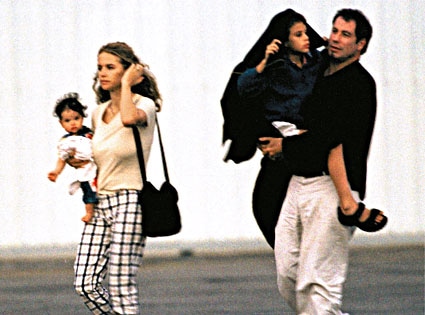 Lucky Mat/Getty Images
Lucky Mat/Getty ImagesKelly Preston has said that she believes toxic cleaning products in her family's home caused her son's health problems early in life.
Jett, her 16-year-old son with husband John Travolta, died suddenly Friday morning after suffering a seizure while on vacation with his familiy in the Bahamas. He was hospitalized when he was 15 months old with Kawasaki disease, a rare illness that mainly affects young children. It's treatable but can have unforeseen complications, including lasting damage to the heart.
The boy's body will remain at Rand Memorial Hospital in the Bahamas pending an autopsy.
The direct cause of Kawasaki disease remains unknown, but some studies have shown a possible link between the disease and exposure to carpet-cleaning chemicals or living in an area close to a stagnant body of water, according to research gathered by Children's Hospital Boston's Kawasaki Disease Program.
Studies also found that the disease is reported more frequently among children from higher socioeconomic groups, of which Jett Travolta was certainly a member. (Brian Littrell of the Backstreet Boys announced last month that his 6-year-old son, Baylee, has been diagnosed with Kawasaki disease.)
In 2002, Preston described to Montel Williams what the family went through when Jett got sick.
"Jett's whole immune system shut down, and he got really sick with high fevers, 104 and 105," she said. "I kept taking him into the doctor and they didn't know what was wrong with him. He developed a rash on his body, swollen lymph glands—it was horrible."
Doctors at Children's Hospital Los Angeles ultimately diagnosed Jett with Kawasaki disease.
"And lo and behold, they don't know how you acquire it, and lo and behold, there were tons of kids in the ICU with Kawasaki's," Preston said. "I'd never even heard of it. And they give you a questionnaire with about 50 questions on it. I went and talked to everybody— every single parent—and everyone had cleaned their carpets in the last couple of weeks. That was one of the questions. So I don't know what the correlation is...I'm just saying we need to know more."
Because of Jett's asthma and allergies, Preston told Williams, "We don't have any chemicals in the house. We're 90 percent organic, though there's some canned foods, a little bit of junk food here and there."
Also in 2002, Preston taped a helpful-hints video for The Oprah Winfrey Show, suggesting ways to childproof the cleaning products in the home.
"When I learned I was pregnant [with now 8-year-old Ella Bleu], the first thing I wanted to do was to create the perfect place to bring my baby home to," Preston said.
"I had all of this nesting energy. I'm sure you know that feeling. But sometimes when we think we are doing the right thing, like scrubbing the nursery spotless, even cleaning the carpet, we are actually inviting dangerous chemicals into our baby's world. Even what these chemicals leave behind can cause problems, so hold off on using so many cleaners."
The Children's Health Environmental Coalition has also recommended that children stay out of a house where the carpet has just been cleaned for at least four hours.
The debate over the exact cause of Kawasaki disease continues, and recent theories have focused on possible bacterial causes and whether children can have a genetic predisposition for infection.
"There is something about the act of shampooing that indirectly caused the outbreak," Dr. David Morens, an epidemiologist at the National Institute of Allergy and Infectious Diseases in Bethesda, Md., told the Austin American-Statesman in 2006.
"It had nothing to do with the chemicals in the shampoo or rug fibers, but more likely with bacteria released into the air. There are whole ecosystems in a carpet...bacteria, spores and fungi that live and grow there."
While common symptoms include a high fever, rash and swollen lymph nodes, cardiac complications can include inflammation of blood vessels in the coronary arteries, aneurysms and, in some cases, heart attacks.
Seizures have also been linked to Kawasaki, according to Aetna's InteliHealth site.
In June 2007, Travolta's legal camp fired back at rumors that the actor and his wife were refusing to publicly admit that Jett had autism and covering it up by claiming the boy had Kawasaki disease instead.
"The Travoltas are wonderful, loving parents, and their priority is their children," a Travolta attorney said. "They have and they continue to take the best possible care of their children. To suggest anything to the contrary is very hurtful to a loving family and also would be false and defamatory."
—Additional reporting by Ashley Fultz